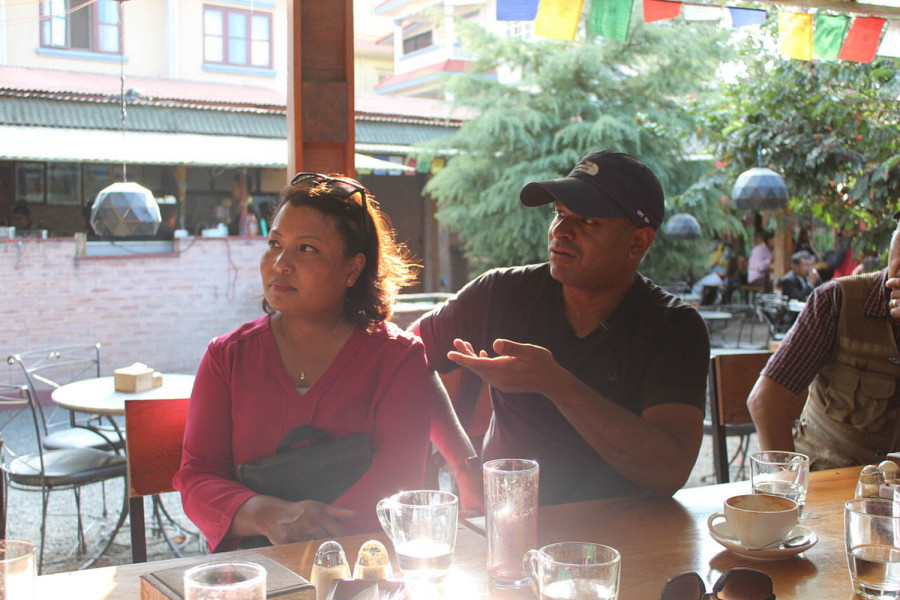National
Foreign spouses struggle to navigate Nepali immigration laws
A group of Nepalis seeks to change the immigration laws in favour of their spouses.
Xenia Klaus
The first thing Nirmala Shakya’s and Jeroen Van den Bergh’s son did after he was born—besides drinking, sleeping and pooping—was break Nepali immigration law. “The fine we had to pay wasn’t a lot—that is not the problem,” Shakya says. “It is more the ridiculousness of it that gets to me.”
Across the table from them, Bhagwati Bista giggles and nods. While Shakya and Van den Bergh don’t have the notice for the fine anymore, Bista can confirm their story. She was also fined for giving birth to her son.
In both the couples—that of Shakya and Van den Bergh, and Bista and her husband—the woman is a Nepali citizen. The man and father of the child isn’t. The Nepali state automatically assumes the citizenship of the father for a child as per article 11 (7) of the constitution.
Without the possibility of dual citizenship, these babies, even though born in Nepal to a Nepali parent, need a visa to stay in the country—or could go through a process to get a naturalised citizenship but not one by descent. It took a while for them to process their passports through the embassies and then another while to get them a visa, say both mothers. During this time, their children were considered illegal immigrants.
While the baby-fines were, in practice, no more than a nuisance, they stand for something bigger for these families: The insecurity of their status, the absurdity of some rules, and the inequality built into the system—as this would not have happened had the fathers and not the mothers of these children were Nepali citizens.
Shakya and Bista are no longer willing to accept all of this. They have both become members of a group of Nepalis married to foreigners. The goal of the group, named ‘Family Rights’, is to improve the status of their spouses without a Nepali citizenship. “We know the question of dual citizenship is an explosive one and that is not what we are pushing for,” says Manish Oli, one of the leaders of the group. “What we want is a residence status for our families.”
Such a status already exists in Nepali immigration laws; but as of today, it can only be acquired if one invests large sums of money in Nepali companies or earns large salaries, but not on the grounds of a relationship.
The ambiguity
Most members of Family Rights have partners staying in Nepal on a marriage visa. The status is regulated under the immigration regulations of 1994 made under the Clause 8(h) of the immigration act of 1992. The status was always somewhat ambiguous. “We never had the explicit right to work,” says Paula, an Chilean citizen who has been living in Kathmandu since 2010. “But neither did someone explicitly tell us we could not.”
Deepesh Ojha, a lawyer who specialises in immigration law, also says that the law on a marriage visa itself is rather vague. “It provides the right to reside in Nepal based on the fact that you are married to a citizen of Nepal,” he says. “Furthermore, the law is not clear regarding whether this entails the right to work in Nepal.”
But then suddenly some of this ambiguousness disappeared. The shift was not to the liking of the foreigners with a marriage visa.
The stamp
According to existing laws, a marriage visa has to be renewed after half a year for the first time and every year thereafter. For this, both spouses have to appear at the immigration office and pay a fee. “Around 2017, they suddenly added a ‘employment prohibited’ stamp to my visa,” Jeroen Van den Bergh takes out his passport and shows a page with that stamp on it. Also Manish Oli’s wife—a Russian citizen and a doctor—received the stamp. Both of the Olis were furious.
“I started knocking on government offices, asking who had decided to start putting this stamp and why,” Oli says. “Nobody could answer me.” One day in 2020, just as suddenly as it had come to the scene, the stamp disappeared.
By that time, Oli’s anger had built up to a fury about the insecure status of his family. He was not about to lay that fury to rest. Through social media he found out that Lopsang Nepali and Karma Tamang—both of them married to foreigners—had done largely the same—knock on authorities’ doors to get the stamp removed.
Nepali had also started to collect signatures on a petition. The three got together and founded Family Rights in November 2023. The group currently has 303 members. In total, according to the group’s data, there are 1,400 families affected. The group has collected 124 signatures on their petition for a residence status for their spouses. Such a status, known to many countries, does not give citizenship or a right to vote. But it provides a certain degree of security.
This security is what they crave, say the group members. Because while the circumstance that the spouses are not explicitly allowed to work is a problem, there are more severe ones. Many spouses work anyways. “You depend on the employer to take the risk, which is not great obviously,” says Paula, the Chilean. But there are more issues.
Who may stay?
The foreign spouses are treated by the state like tourists in most respects: They pay tourist fares on flights and at hospitals, they cannot officially work, and they cannot own immovable property. But in one respect, they are treated even worse than tourists: The right of the foreigner to stay in the country is fully dependent on their spouse.
Therefore, the most substantial problems appear in case the marriage ends—that is if either the Nepali partner dies or they divorce. “No matter how long you have been in the country, if you are here on a marriage visa, you have to leave the country,” Oli says.
Immigration lawyer Ojha says it is true that marriage visas lose their validity as soon as the parties get divorced. “The question then is whether the foreigner can qualify for a different kind of visa.” That mostly depends on the exact constellation of the family. In case of death, Ojha says, a widow can get a visa through “in-person verification” of immediate family members of the deceased husband, according to section 4.4 (4) of the Immigration Rules of 2008.
No specific provisions are made for the vice-versa case of a widower whose Nepali wife has died. This is not an option for divorcees: “In that case a relationship visa through the family of the ex-husband is not possible,” says Ojha. Also having a child with a Nepali citizen is not grounds per se to be granted a visa, even if that child is a minor, as there are no specific provisions for this case in the immigration rules.
“These rules tear families apart,” says Manish Oli. “And that the right to be in Nepal is so immediately tied to the husband can keep especially women trapped in abusive relationships.” Consequences can get severe when one does not leave when ordered to. After the wife of the German citizen Manfred Neumann died in 2011, his marriage visa expired. After 34 years in the country, Neumann decided to stay anyway. When caught, he was sent to jail for three years—though the Supreme Court later quashed that punishment.
The money question
There is another big problem that often awaits foreigners soon after the death of their spouse or divorce: they are not allowed to own immovable property in Nepal as the section 432 of the civil code of 2017 bars the transfer of any immovable property to foreigners without a special permission from the government. “In case of a divorce, the foreign spouse is still entitled to some of the couple's assets. They are also entitled to inherit immovable property if the partner dies,” says Ojha.
There is a big hurdle to that: While section 433 of the civil code of 2017 does allow for them to receive immovable property by partition or inheritance, the foreign spouse is then not allowed to own what they received in terms of immovable property. “What happens in practice is that they get a provisional ownership certificate valid solely for the transfer process,” says Ojha. “Then they immediately have to sell the property to a Nepali buyer.”
Even if the foreigner has successfully sold their share of immovable property, there can be more problems. “They are not allowed to take major sums of money abroad,” says Ojha. The foreign exchange regulation act of 2019 regulates all cases in which repatriation of assets is allowed, and it does not make any provisions for such sales proceedings. So while the foreigner might have to leave, they can’t take their belongings with them.
Little understanding
The residence status the group is pushing for should be crafted in a way to solve all of this, says Manish Oli. The group furthermore wants that the law be the same for all genders. Manish Oli and Lopsang Nepali say they met with a number of politicians over the past year, trying to convince them of their cause. They say they will keep knocking on the authorities’ doors for as long as it takes.
A simple solution is already in place in India: The ‘Overseas Citizenship of India’ largely gives an individual the same right as the ‘Non Residential Nepali’ status but can also be acquired while residing in India. And in India the Overseas Citizenship can be extended to spouses and kids.
“I agree that the Nepali immigration law needs an overhaul,” says Ojha, the lawyer. “Immigration laws today are very restrictive. We have to accommodate for new realities with the necessary flexibility. We are falling behind other countries that have already adopted more adaptable immigration policies.”
The spokesperson of the Department of Immigration said that he cannot comment on whether the current laws are fair and if they will be changed. “It is up to the parliament to make the laws. We only implement.”
Nirmala Shakya, the woman who was fined for giving birth to a Dutch son, says that when she explains their cause to their friends they often get little understanding. “Many people ask us why we didn’t just move to the Netherlands, where I actually would have many rights my husband does not have here,” Shakya says. “I find that a weird question. Our life is here. This is home for both of us.”




 11.12°C Kathmandu
11.12°C Kathmandu














